$11 Billion-A-Year Selling Dogs
Kim Kavin, The Dog Merchants
 Driven by her incredible curiosity, Kim Kavin uncovered the world of dog auctions. 11 BILLION dollars exchanges hands during the buying and selling of companion animals. Even the so-called 'rescues' are partaking in the auction process, using donated dollars to buy, rehabilitate and adopt these dogs at considerably high prices. While not necessarily humane, nor ethical, it's legal simply because pets are viewed as property in the eyes of the law.
Driven by her incredible curiosity, Kim Kavin uncovered the world of dog auctions. 11 BILLION dollars exchanges hands during the buying and selling of companion animals. Even the so-called 'rescues' are partaking in the auction process, using donated dollars to buy, rehabilitate and adopt these dogs at considerably high prices. While not necessarily humane, nor ethical, it's legal simply because pets are viewed as property in the eyes of the law.
We love them with all our hearts, but do we really know where our dogs came from? Kim was surprised when she first heard of dog auctions in the Midwest. She wasn't sure if it was legal or even regulated. She was so curious she flew out there to see it for herself.
She ended up sitting in a barn in Missouri and watched about 300 dogs over the course of 8 hours get auctioned off to the highest bidders. It was a bright, light barn with bleachers. Many people were there, even bringing their children. There were also concessions where you could purchase snacks and sodas. She says it was like being at the county fair.
On that particular day, over $100,000 exchanged hands, paid by both breeders and rescuers, who were bidding on the same dogs. This included litters that were brought to the auction by commercial breeders who have no more use for them. Perhaps they were looking to get paid off and to move on to their next venture.
 When Kim interviewed the owner of the dog auction, she found out that about two-thirds of the people were commercial breeders looking to buy dogs to add to their operations and the other one-third of the people were rescuers trying to outbid them.
When Kim interviewed the owner of the dog auction, she found out that about two-thirds of the people were commercial breeders looking to buy dogs to add to their operations and the other one-third of the people were rescuers trying to outbid them.
This might even lead to a litter of puppies from the same mother being split in two. The breeders would purchase half of the litter and take them home and sell them for thousands of dollars as purebreds, while the other half of the litter would be bought by the rescuers who would move the dogs to other states where there was a need and sell them for a couple of hundred dollars and call them rescuers from puppy mills, even after they had handed over the money to buy them. A commission would be made for both types of purchases to the dog auctioneer.
Kim reveals how dog merchants create markets for dogs, often in defiance of the usual rules of supply and demand. She takes an investigative approach and meets breeders and rescuers at all levels, shedding much-needed light on an industry that most people don't even realize is an industry.
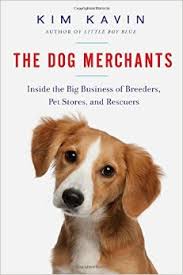 Unfortunately this is all legal, as animals are considered property. It is just buying and exchanging property for cash. Hopefully, the laws will change where animals will no longer be considered property but family members.
Unfortunately this is all legal, as animals are considered property. It is just buying and exchanging property for cash. Hopefully, the laws will change where animals will no longer be considered property but family members.
Kim Kavin's new book, The Dog Merchants, is the first book to explain the complex and often surprisingly similar business practices that extend from the American Kennel Club to local shelters, from Westminster champions to dog auctions.
Kim's goal is to advance the conversation about how all dogs are treated, from puppy mills to high-kill shelters. She shows that a great deal can be improved by understanding the business practices behind selling dogs of all kinds.
Instead of pitting rescue and purebred people against each other, The Dog Merchants shows how all dog lovers can come together, with one voice as consumers, on behalf of all our beloved companions.
http://www.dogmerchants.com
3 Things To Calm Pet Allergies
Dr. Marty Becker, America's Veterinarian
 Dr. Becker tells us that the number one reason people take their pets to the vet is because of allergies and skin problems. But before you rush your pet to the vet, there are some things you can do at home.
Dr. Becker tells us that the number one reason people take their pets to the vet is because of allergies and skin problems. But before you rush your pet to the vet, there are some things you can do at home.
The first thing you need to do to help your pet with allergies is to bathe them weekly. You should also use a shampoo that is recommended by your veterinarian. By doing this, you can expect to get a dramatic decrease in skin problems because it will wash away many, or most of, the allergy triggers that are on your pet's coat or skin.
Think of your dog as a 4-legged swifter or dust mop. What you are doing by giving them a bath once a week is recharging the swifter or just cleaning out the dust mop. Surprisingly, this will not dry out their skin when using the proper shampoo.
Another thing you can do is to give your dog a 5-minute cool water soak, if they have really sensitive skin. Do this after their bath. Warm water aggravates the itching and cool water diminishes the skin inflammation.
One item we hear a lot about is oatmeal, which is really good for a pet's skin. Many veterinarian dermatologists recommend adding colloidal oatmeal, like Aveeno, to the bath water to give it a smooth, silky feel which helps to calm down skin inflammation.
For his dogs, Dr. Becker uses Earth Bath Shampoo and then adds Aveeno. However, there are a lot of good shampoos, which make it difficult to choose.
 You can also use unscented baby wipes to wipe down your pet every time they go outside to do their business. This will help to remove any allergens they may have picked up outside.
You can also use unscented baby wipes to wipe down your pet every time they go outside to do their business. This will help to remove any allergens they may have picked up outside.
It's also a good idea to keep your pets inside during the peak pollen times, as there are certain times of the day when pollen is at its worse, especially in the early morning and evening.
There is a new product on the market called Apoquel, which has been out about 18 months. Dr. Becker states that this is a miracle pill for pets with allergies, which must be given every day.
Dr. Becker fought skin problems with one of his own dogs for four years. Literally, after giving his dog the Apoquel pill, she stopped itching within 2 hours and hasn't itched since. This pill can be given to dogs with all types of allergies, from pollen to dust mites and even food sensitivities. It can be very difficult to diagnose just which allergy or allergies your dog has and fortunately this pill works on all types of allergies, with no side effects.
Dr. Becker has been practicing veterinary medicine for more than 30 years and is a best-selling author, syndicated columnist and a frequent guest on national shows. You can also find Dr. Becker on Vetstreet.com, a new animal health and lifestyle website dedicated to giving pet owners the most accurate information possible to keep their pets healthy and happy. Follow Dr. Becker on Facebook and Twitter.
http://www.drmartybecker.com
 Pet Flipping - SevenTips to Safeguard Your Pet - Dr. Debbie
Pet Flipping - SevenTips to Safeguard Your Pet - Dr. Debbie
Pet lovers beware of the disturbing criminal trend called "Pet Flipping." This is when a person steals a pet or takes ownership of a lost pet, and then sells the animal. Pets are typically sold on the Internet to make a quick profit. The American Kennel Club (AKC) reports a rise in pet thefts.
Pet flippers most commonly target purebred dogs because they can fetch a high price, but even mixed breed dogs are at risk. Dogs are swiped from porches, fenced in back yards, dog parks, and cars. Some pet scams involve a person advertising as a pet sitter or trainer, who then disappears with your pet. Other scams involve someone who steals a pet and then responds to the lost pet ad, making money on rewards.
Top 7 Tips to Prevent Pet Flipping:
1. Don't Leave Your Pet Unattended
Avoid leaving your pet unattended, even in your own backyard. Don't leave your pet outside of stores or coffee shops. Tying your dog's leash up while you run that quick errand can give a thief the few minutes he needs to snatch your pet while you step away. Keep a watchful eye on your dog when visiting dog parks.
2. Get Your Pet Microchipped
A microchip is one of the best tools to reunite lost pets and serves as legal proof of ownership. Be sure to keep your contact information up to date with the microchip company.
 3. Use GPS Collars
3. Use GPS Collars
A GPS collar allows you to track your dog's movement minute by minute. These units can help you find your pet quickly if lost, but are of little use if a pet flipper removes the collar. I use the Tagg Pet Tracker for my dog and like that I can locate him to a precise location with my smart phone.
4. Get Your Pet Spayed or Neutered
Dogs that aren't spayed or neutered are especially prized targets to thieves since they are perceived as a money-making opportunity. Spaying and neutering also decreases the desire to stray and is good for your pet's health.
5. Research Pet Services Carefully
Before signing on for pet sitting or dog trainer services, research the business person's reputation with the Better Business Bureau. Ask your veterinarian for a referral to a reputable pet professional. Request references before using a new pet service.
6. Buyer Beware
Be cautious when buying a pet online and only use reputable breeders. Check out a breeders standing with the AKC and breed clubs. Be wary of individuals that lack documentation of breeding or veterinary health care records.
7. Sign Up For Doggie Facial Recognition Apps
High-tech facial recognition technology is now available to identify and track down lost pets with services like Finding Rover. Use your IPhone to download the app at http://findingrover.com. Upload your pet's photo in their database, and promptly notify Finding Rover if your pet is ever lost.
Pet flipping is so heinous because it exploits the cherished relationship between family and a beloved pet. Share this information with fellow pet lovers to spread awareness and halt this criminal trend.
Featured veterinarian known as "Dr. Debbie" on national pet radio program, Animal Radio. Ebook author of "Yorkshire Terriers: How to Be Your Dog's Best Friend"; "Pugs: How to Be Your Dog's Best Friend"; "Mini Schnauzers: How to Be Your Dog's Best Friend"; and "Shih Tzu: How to Be Your Dog's Best Friend."
http://www.drdebbie.net
Genetic Preservation is First Step to Cloning
Melain Rodriguez, ViaGen Pets
 If you are considering cloning your pet, the first step is genetic preservation. Genetic preservation is a safe and simple way for pet parents to preserve genetic material from their pet that is used for cloning, either right away, or at any point down the road.
If you are considering cloning your pet, the first step is genetic preservation. Genetic preservation is a safe and simple way for pet parents to preserve genetic material from their pet that is used for cloning, either right away, or at any point down the road.
To preserve your pet's genes, a veterinarian draws the DNA under a local or general anesthesia. It is basically a small skin biopsy. A good time to have this done is while undergoing other routine procedures, which are already done under anesthesia, like a dental cleaning or even a spay or neuter
Why would you want to do genetic preservation and cloning? Some pet parents consider this a way to honor and give eternal respect to the special bond they shared with their pet. Some clients even get a sense a piece knowing that they have a tangible connection to a special pet that they can't imagine living without. While some even choose genetic preservation now, with the intention of cloning later.
Genetic preservation can also eventually be used for current or future cell-based therapy. This preservation normally costs around $1,600. However, they currently have a special offer for listeners who call in and mention that they heard about ViaGen Pets on Animal Radio.
To learn more, visit ViaGenPets.com or call 888-876-6104.
Celebrating & Thanking Mothers In Nature
Robert Semrow, Animal Radio Listomania
It's May and we need to acknowledge Moms everywhere for all that they do, inspire and go through. To celebrate Moms, I thought I would share some interesting tidbits about animal world moms.
For some animals it is very difficult to know when they are pregnant. Some of the signs are, and I clearly didn't go to vet school for this one, nausea and vomiting and requests for favorite treats and snacks accompanied by late night binge watching of emotionally charged reruns of their favorite animal shows. Ok maybe not. In all seriousness, each animal has it's own unique tendencies and needs when pregnant and giving birth.
 Here are a few fun facts to share at your Mother's Day Appreciation get together:
Here are a few fun facts to share at your Mother's Day Appreciation get together:
Let's start with dogs. Dogs have a gestation period of about nine weeks. Most pregnant dogs don't show any signs until about three weeks in. According to the Guinness Book of World Records, the largest litter of puppies occurred in 2004 in the UK, when Tie, a Neapolitan Mastiff gave birth to 24 puppies consisting of 9 females and 15 males. That's an instant football team.
 Next are cats. Cats also have a gestation period of about 9 weeks and can become pregnant and have kittens as early as 6 months old. You can really see the pregnancy in a cat's belly after about 30 days. According to the Guinness Book of World Records, the largest litter of kittens occurred in 1970 when a Burmese/Siamese cat in the UK gave birth to 19 kittens. A few other fun notes for Cat lovers is that the oldest feline mom was said to be 30 years old at the time she gave birth to 2 kittens. Also, an unofficial record for the most kittens produced by a domestic cat over her lifetime is said to be 420 kittens by a Tabby named Dusty from Texas back in the 1940s and 50s. 420 Kittens, Yikes, that is a lot of birthdays and mouths to feed.
Next are cats. Cats also have a gestation period of about 9 weeks and can become pregnant and have kittens as early as 6 months old. You can really see the pregnancy in a cat's belly after about 30 days. According to the Guinness Book of World Records, the largest litter of kittens occurred in 1970 when a Burmese/Siamese cat in the UK gave birth to 19 kittens. A few other fun notes for Cat lovers is that the oldest feline mom was said to be 30 years old at the time she gave birth to 2 kittens. Also, an unofficial record for the most kittens produced by a domestic cat over her lifetime is said to be 420 kittens by a Tabby named Dusty from Texas back in the 1940s and 50s. 420 Kittens, Yikes, that is a lot of birthdays and mouths to feed.
Horse lovers have much more sympathy for the 11 months of pregnancy that is common for horses. Not only the time, but also the size of the foal is also something to respect. Inspiringly, a foal can be born and stand up within an hour and even be traveling with the herd in as little as a few hours.
 There are so many wonderful ways that mothers in nature bring their young ones in to the world. Some have very specific areas, times of years, and genetically coded habits that make the birth of an animal one of nature's truest gifts. Nature's gift to instill the ability for animals to reproduce successfully for so long in the wild and in the domesticated world is truly something to admire and be thankful for.
There are so many wonderful ways that mothers in nature bring their young ones in to the world. Some have very specific areas, times of years, and genetically coded habits that make the birth of an animal one of nature's truest gifts. Nature's gift to instill the ability for animals to reproduce successfully for so long in the wild and in the domesticated world is truly something to admire and be thankful for.
So this Mother's Day, I'm going to be saying thank you to Mother Nature, as well as my mom, my wife and the mothers of the beloved pets and animals in my life.
Happy Mother's Day to all Mothers.
Share your Mother's Day wishes and stories on our Animal Radio Facebook Page.
http://petworldinsider.com
Litter Box Etiquette
Lucy Pet Foundation
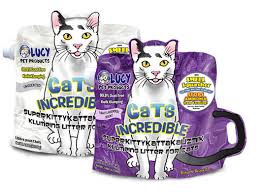 Yes, there indeed is etiquette for your kitty's litter. Doc Halligan (Lucy Pet Foundation) will help any cat owner solve their litter-box issues. Cat not going inside the box? Maybe you're not following the etiquette.
Yes, there indeed is etiquette for your kitty's litter. Doc Halligan (Lucy Pet Foundation) will help any cat owner solve their litter-box issues. Cat not going inside the box? Maybe you're not following the etiquette.
If you have a baby and their diaper gets dirty - you change it. But what if you have a new kitten for the first time - what do you do? People just aren't educated on proper litter box etiquette.
Cats are clean animals. The number one reason cats don't use a litter box is because they don't want to use a litter box that is dirty. They don't want to step in waste. In the wild they would go to a clean spot, do their business and then cover it up.
The rule for the amount of litter boxes you should have is one for every cat plus an extra one. So if you have one cat, you should have two boxes. This means if you can't get to the box to clean it frequently, you will at least have a second one as a backup.
The location of the litter box is also extremely important. Cats have acute hearing and acute sense of smell, as they are predators. This makes them very sensitive to sound and movement. You don't want to put a litter box in an area where there is a lot of commotion and activity. It needs to be in a quiet place. You can places the boxes in separate locations, but if space is limited, you can place them side-by-side.
So do you use a covered box or one that is open and what type of litter do you use? The smell can be amplified in a litter box with a cover. However, if you use Cats Incredible Litter from Lucy Pet Products, which is a clumping litter made from clay that has an extra ingredient that stops ammonia from forming, you can put a lid on the box if your cat prefers. Studies also show that cats prefer clay litter.
Here are some tips to keep your cat happy with their litter box.
- Have as many litter boxes as you have cats plus one extra, and they can be side by side.
- Place the litter boxes in a quiet location that is easily accessible like a bathroom or a spare bedroom.
- Avoid placing the litter box in the laundry or utility room that may be too noisy or has too much traffic.
- Never startle your cat when they are using the litter box.
- Make sure you are using a litter that your cat likes. Studies show that most cats prefer clumping clay litter.
- Make sure you have enough litter in the box. Keep at least 2-3 inches of litter in the litter box at all times and completely change out litter monthly.
- Scoop the litter box at least once a day to remove all urine and fecal waste.
- Never punish your cat for going outside of the litter box.
- Clean you litter box with an antimicrobial soap and rinse thoroughly to remove any traces of ammonia.
- Use the right litter box. Some cats may dislike covered or hooded boxes so it may be advisable to use a traditional open litter box.
Follow these rules of litter box etiquette and both you and your cat will be happy!
The Mission of The Lucy Pet Foundation is to reduce pet overpopulation by having mobile spay/neuter clinics across the country and to support causes that benefit animal welfare. The Lucy Pet Foundation currently has two buses that travel around Southern California focusing on spaying and neutering. These buses are state of the art surgery units. Their next focus is in generating more funds to expand the work of these buses and have more across the country.
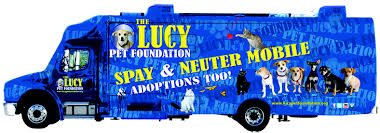 The Lucy Pet Foundation not only offers free and reduced spays and neuters, they also do microchipping, vaccines and de-wormings. Spaying and neutering is not only great for pet population control, but it has been proven that an animal will live on an average of 40-percent longer after having this surgery.
The Lucy Pet Foundation not only offers free and reduced spays and neuters, they also do microchipping, vaccines and de-wormings. Spaying and neutering is not only great for pet population control, but it has been proven that an animal will live on an average of 40-percent longer after having this surgery.
Upcoming Clinics
Free Spay & Neuter for Los Angeles City Residents! Here is a list of upcoming free or reduced fee mobile spay and neuter clinics in California:
Call for more information, questions and to reserve space to get on the list: (855) 499-5829
May 10: Algin Sutton Rec Center, 8800 S. Hoover St., Los Angeles, CA Spay/Neuter APPOINTMENT ONLY; Vaccine Clinic 10:00am-2:00pm
May 11: Hansom Dam Recreation Center, 11480 Foothill Blvd., Los Angeles, CA Spay/Neuter APPOINTMENT ONLY; Vaccine Clinic - 10:00am-2:00pm
May 14, 27, 30: Food 4 Less, 1748 West Jefferson Blvd., Los Angeles, CA Spay/Neuter APPOINTMENT ONLY; Vaccine Clinic 10:00am-2:00pm
May 16: Stetson Ranch Park, 13877 GlenOaks Blvd., Sylmar, CA Spay/Neuter APPOINTMENT ONLY; Vaccine Clinic 10:00am-2:00pm
May 17, 25: Superior Store, 133 West Avenue 45, Los Angeles, CA Spay/Neuter APPOINTMENT ONLY; Vaccine Clinic 10:00am-2:00pm
May 19: West Valley Shelter, 20655 Plummer Street, Chatsworth, CA Spay/Neuter APPOINTMENT ONLY; Vaccine Clinic 10:00am-2:00pm
May 20, 28, 31: Superior Store Pacoima, 9801 Laurel Canyon Blvd., Pacoima, CA Spay/Neuter APPOINTMENT ONLY; Vaccine Clinic 10:00am-2:00pm
May 24: Food 4 Less, 5100 N. Figueroa St., Los Angeles, CA Spay/Neuter APPOINTMENT ONLY; Vaccine Clinic 10:00am-2:00pm
County and City Vouchers accepted. But remember, you must get on a list to have your pet seen at these locations. Please call The Lucy Pet Foundation toll free at 1-855-499-5829 or Email: Info@lucypetfoundation.org to schedule an appointment, or register at the events.
See the current list of clinics at http://www.lucypetfoundation.org.
http://www.lucypetproducts.com
Torus Water Bowl
Kim Goldsworthy, Heyrex
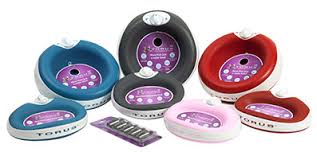 Kim Goldsworthy, of Heyrex, talks to us about the new Torus Watering Bowl for dogs and cats. She states that the bowl is a big hit and that they are receiving a lot of great feedback from this bowl.
Kim Goldsworthy, of Heyrex, talks to us about the new Torus Watering Bowl for dogs and cats. She states that the bowl is a big hit and that they are receiving a lot of great feedback from this bowl.
So what makes the Torus Watering Bowl so different? It is a watering system, portable storage bowl and supplement dispenser all in one.
They key thing is that the Torus Watering Bowl has two reservoirs. In the first one, the water available for the pet to immediately drink and the other one is a storage reservoir that can hold up to 2 liters of water.
Because it stores so much water and keeps it clean, it means that pet parents don't have to constantly remember to fill up the bowl. The bowl then automatically fills the dispenser from the reservoir as your pet drinks it, without power or batteries.
Next is the carbon water filter that filters that removes any impurities that might come from your water source.
There is also a lock on it so you can stop the water from dispensing any time you'd like. You then turn the lock when you want the water to start flowing again. This allows you to provide fresh water for your pet at all times, while allowing you to close it off if you are driving.
This is both a great traveling bowl and a bowl to have at home. Because of its low, stable profile and weight, as well as the non-skid sole, you can leave it in your car without it spilling and your dog won't knock it over at home.
There are two sizes available and 4 different colors to choose from. Who knows, your pet might even drink more water with this bowl!
http://www.toruswaterbowl.com
 The Dogfather's Grooming Tip with Joey Villani
The Dogfather's Grooming Tip with Joey Villani
Can You Use Human Shampoo on Your Pet?
Is there a difference between human and pet shampoo? Can you use human shampoo on your pet? The answer to both questions is yes and no.
Joey explains that if you have an animal with a healthy coat and you use human shampoo, you could end up with a dry, itchy pet. But this is not always the case, as shampoos have a pH and acid level.
In human shampoos, the pH and acid is higher than in pet shampoos. However, there are still a lot of human shampoos that you can use on your pet that are neutral. One way is to test your shampoo level with a pH stick.
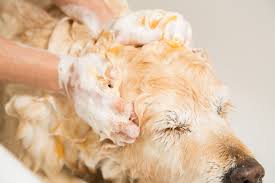 If you have an animal that has chronic skin problems, human shampoo can affect the skin problems and actually make them worse. This is because the shampoo might be very drying, causing them to itch and scratch.
If you have an animal that has chronic skin problems, human shampoo can affect the skin problems and actually make them worse. This is because the shampoo might be very drying, causing them to itch and scratch.
In most cases, unless you really know what's in your shampoo, it's best to stick with pet shampoo.
 Animal Radio News - Lori Brooks
Animal Radio News - Lori Brooks
Does Your Pet Have GPS?
You know that you can track your pet dog or cat with your smartphone. All you need is a GPS locator on their collar. But, there are quite a few pet trackers out there, so the electronics review site ZD Net has some recommendations. When it comes to dogs the one they like is Whistle, because it's so small and light and weighs only 1.3 ounces. It's also waterproof, has a rechargeable battery that's good for 30 days AND the app can also be used to track your dog's long-term health trends. You can also receive notifications if there are significant changes to their activity or sleep patterns. The unit costs $79 and requires a service plan that ranges from $6.95 to $9.95 per month. But what about cats? ZD Net reviewers remind us there are some trackers that claim to work for both cats and dogs, they're only recommended for cats over 8 pounds and that's a pretty big cat. Their cat GPS tracker of choice is called Pawtrack, which was designed especially for cats, for cat owners by cat owners. Pawtrack allows your pet cat to be tracked by GPS and another type of satellite that also detects when the cat is at home. There's only complaint about Pawtrack is its short battery life, only about three days, so you have to remember to charge it regularly. It retails for $160, which includes a 12-month subscription to the locator service. Just thought we'd share this because it can be so confusing when you're trying to make a good choice for your pet but there are so many to choose from and ZD Net has a great reputation when it comes to electronics reviews.
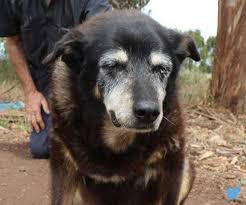 Oldest Dog Dies at Age 30
Oldest Dog Dies at Age 30
Maggie the Kelpie, an Australian dog that was possibly the oldest dog in the world, recently died according to Rodney Habib on Planet Pet. Maggie was 30 years old according to her owner and lived in Australia. At the age of 30, Maggie was over 200 in human years and a contender for the oldest dog in the world. However, her owner had lost the original paperwork for the dog, so her age could not be independently verified. Still, if you're thinking, "No way, no dog could live to be 30," consider that officially, the title of the oldest dog in the world still belongs to Bluey, an Australian cattle-dog who was verified at 29 years and five months when he passed away. According to the Guinness Book of Records, his owner bought him as a puppy in 1910 and he grew up as a working dog with sheep and cattle until he passed in November 1939.
Bissell Pays Michigan Adoption Fees For One Day
If you live in Michigan - heads up! For one day this month, adopting animals from Michigan shelters will be a little easier since Bissell Pet Foundation will pay the adoption fees for cats and dogs at more than 20 shelters around the state on May 7. Those who choose to adopt on that day will only be responsible for licensing fees, which can range from $7 to $12. Bissell will cover fees that average $150 for dogs and $60 for cats. Adopting families will also receive an AdoptBox, which is stocked with toys, treats, cleaning products, coupons & 30 days of pet insurance. Participating shelters can be found at this link.
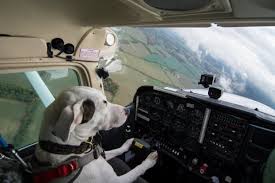 When Dogs Fly
When Dogs Fly
When rescuers met Shadow, the abandoned pup was just 22 hours away from being put down. And now, he's flying an airplane. Shadow was a finalist on the UK reality show, "Dogs Might Fly," which rescues stray dogs and teaches them new tricks, with the goal of training one to successfully pilot a plane. British dog trainer Victoria Stilwell says they looked for dogs "Willing to go the extra mile, to problem-solve and to investigate how to work something out for themselves. In the end the dogs are tested on how successfully they learned to fly through a system of treat-based commands. It's pretty cool. Watch the video.
UK Popular Pet Names
We know the most popular pet names in America for dogs, they're Bella and Max but what names do other countries have as their favorites? In the UK, it turns out that Alfie is the most popular name for dogs and fourth most popular cat name. Interestingly, Alfie does not even crack the top 100 list of most popular pet names in America! So here's the official list for 2016 in the UK and their favorite pet names: Most popular dog names - which are NOT broken down by male and female: Alfie, Poppy, Bella then Charlie. Most popular CAT names in the UK are: same names, different order for cats - Charlie is first for cats, followed by Bella, Poppy then Alfie. And the most popular names for horses are: Rosie, Alfie, Bailey and Belle. Animal Friends Pet Insurance, which did the research, says, "Trends over the last few years have shown that people are now far more likely to give their pets ‘human' names than ever before, which could be attributed to the fact that we are more likely to consider our pets are a part of the family."
 Shelter Dog Sniffs Out Child Porn
Shelter Dog Sniffs Out Child Porn
It is so amazing all the things that shelter dogs, who would have otherwise been put to sleep, are now being trained to do. At just 14 months old, Gia is a sleuthing superstar and the only equipment she needs is her now famous nose. Gia is the newest weapon in a Florida Sheriff's Office arsenal against child pornography. Gia successfully sniffs out tiny Electronic storage cards and devices, literally. Gia can sniff out anything that can hold a memory. Dogs with skills like Gia can cost law enforcement as much as $20,000 to train, but Gia was picked out for her special personality and talents from a local animal shelter and was free to the sheriff's office. Her handler says Gia walks into a room and she can smell the tiny memory devices like we can smell pizza, which is a very good thing, since many most child porn offenders hide things like small thumb drives or even SD cards, often loaded with evidence, in out of the way places like behind an electrical plate in a wall.

NEWS UPDATE brought to you by Drs. Foster & Smith, affordable pet supplies. Low prices every day, so you save on every order.
 Listen to the entire Podcast of this show (#857)
Listen to the entire Podcast of this show (#857)



 Driven by her incredible curiosity, Kim Kavin uncovered the world of dog auctions. 11 BILLION dollars exchanges hands during the buying and selling of companion animals. Even the so-called 'rescues' are partaking in the auction process, using donated dollars to buy, rehabilitate and adopt these dogs at considerably high prices. While not necessarily humane, nor ethical, it's legal simply because pets are viewed as property in the eyes of the law.
Driven by her incredible curiosity, Kim Kavin uncovered the world of dog auctions. 11 BILLION dollars exchanges hands during the buying and selling of companion animals. Even the so-called 'rescues' are partaking in the auction process, using donated dollars to buy, rehabilitate and adopt these dogs at considerably high prices. While not necessarily humane, nor ethical, it's legal simply because pets are viewed as property in the eyes of the law. When Kim interviewed the owner of the dog auction, she found out that about two-thirds of the people were commercial breeders looking to buy dogs to add to their operations and the other one-third of the people were rescuers trying to outbid them.
When Kim interviewed the owner of the dog auction, she found out that about two-thirds of the people were commercial breeders looking to buy dogs to add to their operations and the other one-third of the people were rescuers trying to outbid them.  Unfortunately this is all legal, as animals are considered property. It is just buying and exchanging property for cash. Hopefully, the laws will change where animals will no longer be considered property but family members.
Unfortunately this is all legal, as animals are considered property. It is just buying and exchanging property for cash. Hopefully, the laws will change where animals will no longer be considered property but family members.  Dr. Becker tells us that the number one reason people take their pets to the vet is because of allergies and skin problems. But before you rush your pet to the vet, there are some things you can do at home.
Dr. Becker tells us that the number one reason people take their pets to the vet is because of allergies and skin problems. But before you rush your pet to the vet, there are some things you can do at home.  You can also use unscented baby wipes to wipe down your pet every time they go outside to do their business. This will help to remove any allergens they may have picked up outside.
You can also use unscented baby wipes to wipe down your pet every time they go outside to do their business. This will help to remove any allergens they may have picked up outside. Pet Flipping - SevenTips to Safeguard Your Pet -
Pet Flipping - SevenTips to Safeguard Your Pet - 3. Use GPS Collars
3. Use GPS Collars
 If you are considering cloning your pet, the first step is genetic preservation. Genetic preservation is a safe and simple way for pet parents to preserve genetic material from their pet that is used for cloning, either right away, or at any point down the road.
If you are considering cloning your pet, the first step is genetic preservation. Genetic preservation is a safe and simple way for pet parents to preserve genetic material from their pet that is used for cloning, either right away, or at any point down the road. Here are a few fun facts to share at your Mother's Day Appreciation get together:
Here are a few fun facts to share at your Mother's Day Appreciation get together:
 Next are cats. Cats also have a gestation period of about 9 weeks and can become pregnant and have kittens as early as 6 months old. You can really see the pregnancy in a cat's belly after about 30 days. According to the Guinness Book of World Records, the largest litter of kittens occurred in 1970 when a Burmese/Siamese cat in the UK gave birth to 19 kittens. A few other fun notes for Cat lovers is that the oldest feline mom was said to be 30 years old at the time she gave birth to 2 kittens. Also, an unofficial record for the most kittens produced by a domestic cat over her lifetime is said to be 420 kittens by a Tabby named Dusty from Texas back in the 1940s and 50s. 420 Kittens, Yikes, that is a lot of birthdays and mouths to feed.
Next are cats. Cats also have a gestation period of about 9 weeks and can become pregnant and have kittens as early as 6 months old. You can really see the pregnancy in a cat's belly after about 30 days. According to the Guinness Book of World Records, the largest litter of kittens occurred in 1970 when a Burmese/Siamese cat in the UK gave birth to 19 kittens. A few other fun notes for Cat lovers is that the oldest feline mom was said to be 30 years old at the time she gave birth to 2 kittens. Also, an unofficial record for the most kittens produced by a domestic cat over her lifetime is said to be 420 kittens by a Tabby named Dusty from Texas back in the 1940s and 50s. 420 Kittens, Yikes, that is a lot of birthdays and mouths to feed.
 There are so many wonderful ways that mothers in nature bring their young ones in to the world. Some have very specific areas, times of years, and genetically coded habits that make the birth of an animal one of nature's truest gifts. Nature's gift to instill the ability for animals to reproduce successfully for so long in the wild and in the domesticated world is truly something to admire and be thankful for.
There are so many wonderful ways that mothers in nature bring their young ones in to the world. Some have very specific areas, times of years, and genetically coded habits that make the birth of an animal one of nature's truest gifts. Nature's gift to instill the ability for animals to reproduce successfully for so long in the wild and in the domesticated world is truly something to admire and be thankful for.  Yes, there indeed is etiquette for your kitty's litter. Doc Halligan (Lucy Pet Foundation) will help any cat owner solve their litter-box issues. Cat not going inside the box? Maybe you're not following the etiquette.
Yes, there indeed is etiquette for your kitty's litter. Doc Halligan (Lucy Pet Foundation) will help any cat owner solve their litter-box issues. Cat not going inside the box? Maybe you're not following the etiquette.  The Dogfather's Grooming Tip with
The Dogfather's Grooming Tip with  If you have an animal that has chronic skin problems, human shampoo can affect the skin problems and actually make them worse. This is because the shampoo might be very drying, causing them to itch and scratch.
If you have an animal that has chronic skin problems, human shampoo can affect the skin problems and actually make them worse. This is because the shampoo might be very drying, causing them to itch and scratch. Animal Radio News -
Animal Radio News -  Oldest Dog Dies at Age 30
Oldest Dog Dies at Age 30
 When Dogs Fly
When Dogs Fly
 Shelter Dog Sniffs Out Child Porn
Shelter Dog Sniffs Out Child Porn
